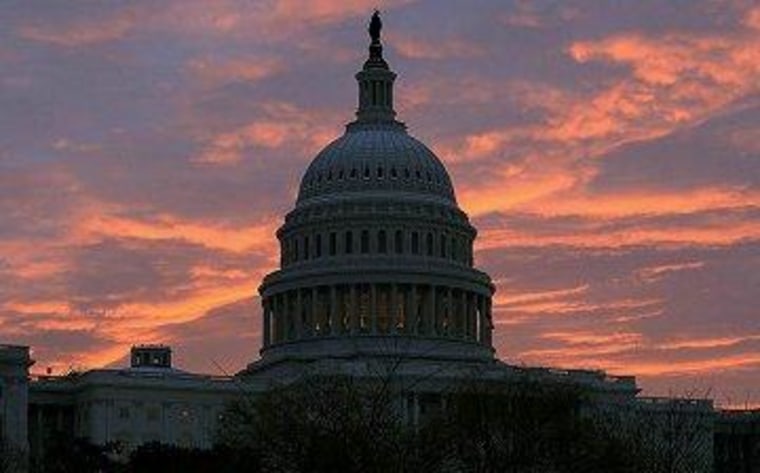It didn't generate much attention at the time, but in the closing days of 2012, while most of the political world was focused on the so-called "fiscal cliff," Congress also had to take the time to reauthorize the government's warrantless surveillance program. A handful of senators -- Ron Wyden (D-Ore.), Jeff Merkley (D-Ore.), Pat Leahy (D-Vt.), Rand Paul (R-Ky.) -- proposed straightforward amendments to promote NSA disclosure and add layers of accountability, but as Adam Serwer reported at the time, bipartisan majorities rejected each of their ideas.
In effect, every senator was aware of dubious NSA surveillance -- some had been briefed on the programs in great detail -- but a bipartisan majority was comfortable with an enormous amount of secrecy and minimal oversight. Even the most basic of proposed reforms -- having the NSA explain how surveillance works in practice -- were seen as overly intrusive. The vast majority of Congress was comfortable with NSA operating under what are effectively secret laws.
With this in mind, Jonathan Bernstein asked a compelling question over the weekend and provided a persuasive answer: "If you don't like the revelations this week about what the NSA has been up to regarding your phone and Internet data, whom should you blame?"
There is, to be sure, plenty of blame to go around. The NSA has pushed the limits; federal courts approved the surveillance programs; George W. Bush got this ball rolling; President Obama kept this ball rolling; and telecoms have clearly participated in the efforts.
But save plenty of your blame -- perhaps most of your blame -- for Congress.Did you notice the word I used in each of the other cases? The key word: law. As far as we know, everything that happened here was fully within the law. So if something was allowed that shouldn't have been allowed, the problem is, in the first place, the laws. And that means Congress.
It's worth pausing to note that there is some debate about the legality of the exposed surveillance programs. Based on what we know at this point, most of the legal analyses I've seen suggest the NSA's actions were within the law, though we're still dealing with an incomplete picture, and there are certainly some legal experts who question whether the NSA crossed legal lines.
But if the preliminary information is accurate, it's hard to overstate how correct Bernstein is about congressional culpability.
Towards the end of the Bush/Cheney era, there was a two-pronged debate about surveillance. On the one hand, there were questions about warrantless wiretaps and NSA data mining. On the other, there was the issue of the law: the original FISA law approved in 1978 was deemed by the Bush administration to be out of date, so officials chose to circumvent it, on purpose, to meet their perceived counter-terrorism needs.
In time, bipartisan majorities in Congress decided not to hold Bush/Cheney accountable, and ultimately expanded the law to give the executive branch extraordinary and unprecedented surveillance powers.
In theory, Obama could have chosen a different path after taking office in 2009, but the historical pattern is clear: if Congress gives a war-time president vast powers related to national security, that president is going to use those powers. The wiser course of action would be the legislative branch acting to keep those powers in check -- limiting how far a White House can go -- but our contemporary Congress has chosen to do the opposite.
This is, by the way, a bipartisan phenomenon -- lawmakers in both parties gave Bush expansive authority in this area, and lawmakers in both parties agreed to keep these powers in Obama's hands. What's more, they not only passed laws these measures into law, they chose not to do much in the way of oversight as the surveillance programs grew.
OK, but now that the NSA programs are causing national controversies again, perhaps Congress will reconsider these expansive presidential powers? Probably not -- on the Sunday shows, we heard from a variety of lawmakers, some of whom expressed concern about the surveillance, but most of whom are prepared to allow the programs continue untouched.
Indeed, for many lawmakers on the right, the intended focus going forward won't be on scaling back NSA efforts, but rather, will be on targeting the leaks that exposed the NSA efforts.
Conservatives, in particular, seem especially eager to leave these powers in the president's hands -- even though they have nothing but disdain for this particular president. And as Jon Chait explained, support for the NSA programs from the right will matter a great deal: "The Republican response is crucial, because it determines whether the news media treats the story as a 'scandal' or as a 'policy dispute.'"
Michael Kinsley, referencing campaign-finance laws, once argued that in Washington, the scandal isn't what's illegal; the scandal is what's legal. I've been thinking a lot about this adage in recent days.
If the reports are accurate and the NSA is acting within the law, but you nevertheless consider the surveillance programs outrageous, there is one remedy: Congress needs to redraw the legal lines. At least for now, the appetite for changes among lawmakers appears limited, which only helps reinforce the thesis about who's ultimately responsible for this mess.
